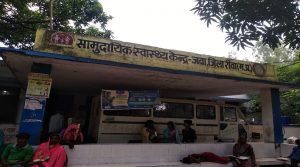 A Team of Environics Trust visited Khajuraho, Panna, Satna and Rewa districts of Madhya Pradesh in September 2018 and made observations at the Primary Health Center (PHC), Community health Center (CHC) and District Health Center (DHC) in these districts. During the visit, the team had regular consultations about the facilities being provided in the rural areas. The government planning, policies, and facilities for the rural populace, especially the female, were discussed in detail with Block Medical Officer (BMO), health counsellors, doctors and lab assistant.
A Team of Environics Trust visited Khajuraho, Panna, Satna and Rewa districts of Madhya Pradesh in September 2018 and made observations at the Primary Health Center (PHC), Community health Center (CHC) and District Health Center (DHC) in these districts. During the visit, the team had regular consultations about the facilities being provided in the rural areas. The government planning, policies, and facilities for the rural populace, especially the female, were discussed in detail with Block Medical Officer (BMO), health counsellors, doctors and lab assistant.
During the course of interaction, we identified specific schemes, like, Sadar Vallabh Bhai Patel Yojna, Deen Dayal Upadhyay Yojna, Pradhan Mantri Matratva Vandana Yojna, Janani Suraksha Yojna, Mukhyamantri Shramik Sewa Prasuti Sahayata Yojna, as focal areas for our current study.
The BMO of Khajuraho, Mr Satyendra Gupta, provided us all the necessary information regarding these schemes. Under Sardar Vallabh Bhai Patel Yojna free medical facilities are provided to people. There are 121 types of medicines provided free of cost to the poor people of district. For vasectomy (Nasbandi) operation, as an incentive, female and male gets Rs 2000/- and Rs 4000/-, respectively.
Janani Suraksha Yojana (JSY)
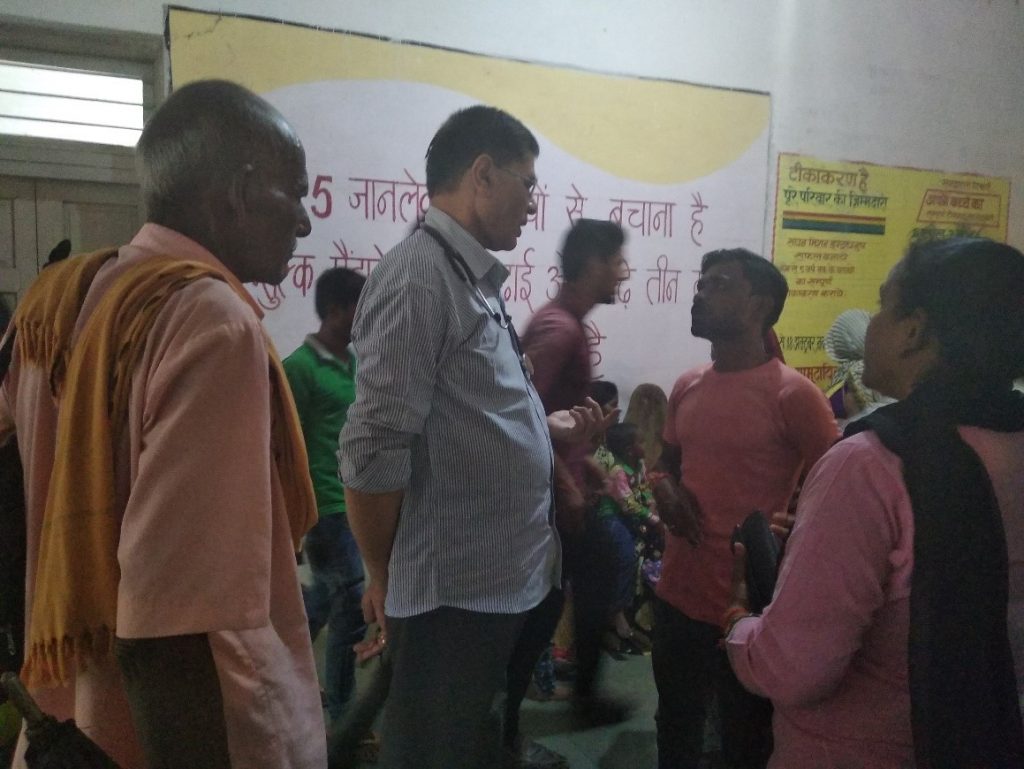
Patients interacting with a doctor
This scheme is being implemented by Health department of Madhya Pradesh. The scheme ensures safe delivery of babies, ultimately aimed towards the reduction of maternity and mortality rate.
Under Janani Suraksha Yojana (JSY) the government provides cash incentive for pregnant mothers to have institutional births as well as pre- and ante-natal care. Transport is made available to pregnant women under ‘Parivahan Yojana’. During the last two and half years, more than ten lakh women have been benefited by Janani Suraksha Yojana. The scheme has proved to be successful in urban and rural areas, both. Under this scheme, Rs. 1400 is given to each pregnant women in the rural areas and Rs.1000 in the urban areas. The person bringing the pregnant woman to hospital for delivery is given Rs. 600 in the rural areas and Rs. 200 in the urban areas.
In this scheme, one can also call ‘108’ for free ambulance services, named as Janani Express.
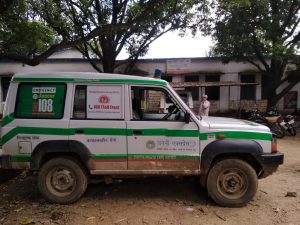
Janani Express under Janani Surakhsha Yojna
Mukhya Mantri Shramik Sewa Prasuti Sahayata Yojna
If a registered unorganized labour woman cannot go to work during pregnancy, then she remains unpaid. Hence some women leave their job during pregnancy and in such cases government compensate/reimburse them in order to reduce their financial suffering. 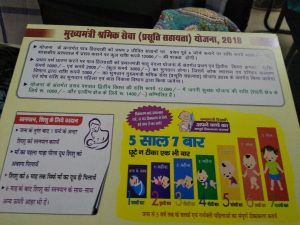
For taking advantage of this scheme, each pregnant women is given Rs. 16,000 into two instalments. The first instalment of Rs. 4000 is given for the last three months of pregnancy during the pre-delivery prenatal check by the doctor or Auxiliary Nurse Midwifery (ANAM). The second instalment of Rs. 12,000 will be given at the government hospital, after the institutional birth of the new-born. Subsequently, the infant is also entitled for the Zero, Doz, VCG, OPD and HBV vaccination.
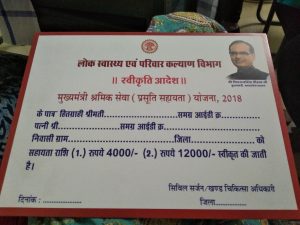
We were also chance witnesses to the actual implementation of scheme on the ground. While we were there, we witnessed a case where a woman named Mrs Tulsa Ahirwar gave birth to a healthy baby on 24 April but she was unable to get her entitlement of Rs 16,000, due to the wrangling between two wings of the same department – PHC & CHC.
Accredited Social Health Activist (ASHA) worker who has a major role to play, turned out to be the most corrupt link in this case. The ASHA worker did not take Mrs Tulsa Ahirwar to PHC but got her admitted in CHC for vaccinations, before the birth of the baby. Then for putting her signature on the official papers (a pre-condition for getting financial assistance under the scheme), ASHA worker sought bribe from Mrs Tulsa Ahirwar. Meanwhile, ANM of PHC named Ms Sridevi stated on record that she is not responsible to sign any official paper of Mrs Tulsa Ahirwar as she has not given any vaccination before or after birth of Tulsa’s baby. As Tulsa has given birth to her baby in PHC which is near to her residence. We brought this case to the knowledge of BMO but he too was not able to resolve this issue, till our departure.
This episode points to a more rigorous monitoring system for the implementation of various women-related welfare schemes so that economically weaker women are not deprived of such well-intended schemes.
It is an overview of mapping health schemes focusing on women. As the process is ongoing, we will share next round of our experiences, after our next field-work.
Author – Bharti

Recent Comments